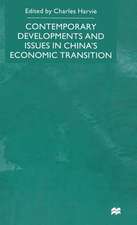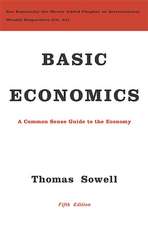Wealth, Poverty and Politics
Autor Thomas Sowellen Limba Engleză Hardback – 5 sep 2016
Wealth, Poverty and Politics challenges the assumptions, the definitions, the evidence and the reasoning of most of what is said about differences of income and wealth by people in the media, in academia and in politics. After an extensive examination of factors behind the economic differences between nations and within nations -- including geographic, demographic, cultural and political factors -- the last section of the book is a searching critique of leading income redistributionists, from John Rawls to Thomas Piketty and Nobel laureates in economics Paul Krugman, Angus Deaton and Joseph Stiglitz.
Among the more heartening findings from history are the individuals, groups and nations that have risen from poverty and backwardness to prosperity and achievements on the frontiers of human progress. Among the more painful findings are counterproductive creeds and policies that have needlessly prolonged poverty and dependency among lagging groups in countries around the world, and whipped up resentments -- and sometimes violence -- against more productive and successful minorities in many places and times.
Although Wealth, Poverty and Politics offers many new analyses and insights, it is essentially a fact-based study which subjects many beliefs, from various parts of the ideological spectrum, to the ultimate test of empirical evidence. These challenged beliefs about the causes of economic differences range from genetic determinism to exploitation and discrimination. In each case, the analysis follows where the facts lead, whether that is verification, refutation or some combination of the two. Its guiding principle is expressed in a quotation from the late Daniel Patrick Moynihan that opens the final section of the book: "You're entitled to your own opinions, but you're not entitled to your own facts."
Preț: 240.91 lei
Nou
46.11€ • 50.11$ • 38.76£
Carte disponibilă
Livrare economică 31 martie-14 aprilie
Livrare express 15-21 martie pentru 50.11 lei
Specificații
ISBN-10: 046509676X
Pagini: 576
Dimensiuni: 160 x 238 x 52 mm
Greutate: 0.79 kg
Ediția:Second Edition, Revised and Enlarged Edition
Editura: BASIC BOOKS
Colecția Basic Books
Descriere
A revised and enlarged edition of Thomas Sowell's essential examination of differences of wealth and income between nations and within nations
Wealth, Poverty and Politics challenges the assumptions, the definitions, the evidence and the reasoning of most of what is said about differences of income and wealth by people in the media, in academia and in politics. After an extensive examination of factors behind the economic differences between nations and within nations -- including geographic, demographic, cultural and political factors -- the last section of the book is a searching critique of leading income redistributionists, from John Rawls to Thomas Piketty and Nobel laureates in economics Paul Krugman, Angus Deaton and Joseph Stiglitz.
Among the more heartening findings from history are the individuals, groups and nations that have risen from poverty and backwardness to prosperity and achievements on the frontiers of human progress. Among the more painful findings are counterproductive creeds and policies that have needlessly prolonged poverty and dependency among lagging groups in countries around the world, and whipped up resentments -- and sometimes violence -- against more productive and successful minorities in many places and times.
Although Wealth, Poverty and Politics offers many new analyses and insights, it is essentially a fact-based study which subjects many beliefs, from various parts of the ideological spectrum, to the ultimate test of empirical evidence. These challenged beliefs about the causes of economic differences range from genetic determinism to exploitation and discrimination. In each case, the analysis follows where the facts lead, whether that is verification, refutation or some combination of the two. Its guiding principle is expressed in a quotation from the late Daniel Patrick Moynihan that opens the final section of the book: "You're entitled to your own opinions, but you're not entitled to your own facts."



















